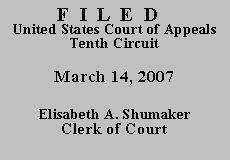

| CALVIN SHANE MYERS,
v.
LOWELL H. CLARK |
|
Before HENRY, BRISCOE, and O'BRIEN,
Circuit Judges.
After examining the briefs and appellate record, this panel has determined
unanimously that oral argument would not materially assist the determination of
this appeal. See Fed. R. App. P. 34(a)(2); 10th Cir. R. 34.1(G). The case is
therefore ordered submitted without oral argument.
Calvin Myers, a state prisoner proceeding pro se(1) and in forma pauperis, filed a 28 U.S.C. § 2254 petition for writ of habeas corpus. The district court dismissed the petition as untimely. Myers then requested a certificate of appealability (COA). Because the district court did not rule on the request within thirty days, we deem it denied. See 10th Cir. R. 22.1(C). Myers renews his application for a COA with this Court. For the same reasons set forth by the district court, we DENY a COA and dismiss his application.
Background
The State of Utah charged Myers with two counts of aggravated murder, both capital offenses, alleging Myers had killed his girlfriend and her unborn child. Myers entered an unconditional guilty plea to one count of aggravated murder and the trial court dismissed the second count in accordance with a plea agreement. On February 6, 1996, the trial court sentenced Myers to life imprisonment with the possibility of parole. Myers did not file a direct appeal.
In July 2000, Myers filed a petition for post-conviction relief in Utah state court. The petition was dismissed on the basis of state procedural bars and the court's finding Myers' trial counsel was not ineffective. Myers appealed this decision and the Utah Supreme Court affirmed the dismissal. Myers v. State of Utah, 94 P.3d 211 (Utah 2004). Myers then filed a § 2254 petition on May 23, 2005, asserting, inter alia, his claims were not procedurally barred. The district court dismissed the petition, concluding Myers' claims were untimely under the Antiterrorism and Effective Death Penalty Act of 1996 (AEDPA).
Certificate of Appealability
A COA is a jurisdictional pre-requisite to our review. Miller-El v. Cockrell, 537 U.S. 322, 336 (2003). We will issue a COA only if Myers makes a "substantial showing of the denial of a constitutional right." 28 U.S.C. § 2253(c)(2). To make this showing, he must establish that "reasonable jurists could debate whether . . . the petition should have been resolved [by the district court] in a different manner or that the issues presented were adequate to deserve encouragement to proceed further." Slack v. McDaniel, 529 U.S. 473, 484 (2000) (quotations omitted). Insofar as the district court dismissed his habeas petition on procedural grounds, Myers must demonstrate both that "jurists of reason would find it debatable whether the petition states a valid claim of the denial of a constitutional right and that jurists of reason would find it debatable whether the district court was correct in its procedural ruling." Id. "Where a plain procedural bar is present and the district court is correct to invoke it to dispose of the case, a reasonable jurist could not conclude either that the district court erred in dismissing the petition or that the petitioner should be allowed to proceed further." Id. We review the district court's factual findings for clear error and its legal conclusions de novo. English v. Cody, 241 F.3d 1279, 1282 (10th Cir. 2001).
Because Myers' conviction became final before the effective date of AEDPA, April 1996, Myers was required to file his §2254 petition by April 1997, unless the limitation period was tolled. Gibson v. Klinger, 232 F.3d 799, 803 (10th Cir. 2000) (one-year statute of limitations does not begin to run until AEDPA's effective date, April 24, 1996, for convictions becoming final before that date). The district court found Myers filed his § 2254 petition more than one year after the effective date of AEDPA and there was no justification for equitable tolling. See Fisher v. Gibson, 262 F.3d 1135, 1142 (10th Cir. 2001).
Myers argues he filed within one year of the Utah court's resolution of his state post-conviction claims and, therefore, his petition was timely filed. While a claim for state post-conviction relief will generally toll the limitations period, it will not toll a limitation period which has already expired. Fisher, 262 F.3d at 1142-43. Myers filed his post-conviction claims in July 2000, after the 1997 AEDPA statute of limitations had already expired.
Myers also fails to present sufficient grounds for the application of equitable tolling, a remedy applied only in "rare and exceptional circumstances." Gibson, 232 F.3d at 808 (quotations omitted). Consequently, the district court's dismissal order is not reasonably debatable. Slack, 529 U.S. at 484. Myers has failed to make a sufficient showing he is entitled to a COA. We DENY a COA and dismiss the application.
Entered by the Court:
Terrence L. O'Brien
United States Circuit Judge
1. Pro se pleadings are liberally construed. Ledbetter v. City of Topeka, Kan., 318 F.3d 1183, 1187 (10th Cir. 2003). Myers' motion to proceed in forma pauperis on appeal was granted by the district court.